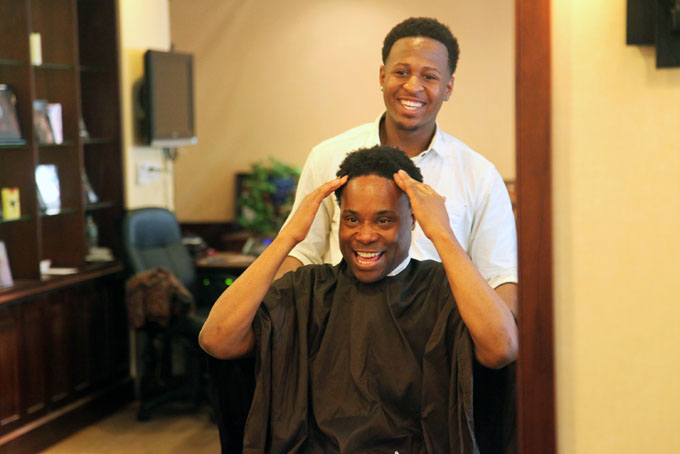
This May 31, 2013 photo shows Tony Award nominee Billy Porter discussing his haircut with stylist Valjean Guerra at the men’s spa BBraxton in the Harlem neighborhood of New York. Porter hopes to win his first Tony as best actor in a musical for his role as a drag queen in “Kinky Boots.” (AP Photo/Mark Kennedy)
LOSING HIS WAY
Making sure his Tony look is just right isn’t just about vanity for Porter. He’s also showing respect. The Tony Awards in 1982 changed his life as an 11-year-old boy.
He grew up in the Pentecostal Church in Pittsburgh and “it always felt like there was a calling on my life.” He had dabbled a bit in theater, but never connected to traditional Broadway music. He had a higher goal.
“When you grow up in the church, the only translation in that insular world that people understand is preaching. You’re supposed to be a minister. So I was going down that path and then I saw the Tonys.”
On the telecast, Porter watched Jennifer Holliday, Sheryl Lee Ralph, Loretta Devine and other cast members from “Dreamgirls” perform “It’s All Over” and “And I’m Telling You (I’m Not Going).”
What he saw were beautiful African-Americans in unbelievable costumes singing powerful songs. He was hooked. “It was a moment where I realized, ‘Oh, my ministry is that. A version of that.'”
He was named the 1992 male champion on “Star Search,” graduated from Carnegie Mellon University and showed up in New York 23 years ago with a voice that could break glass. Then he lost his way.
“I played my trump card,” he says. His voice was amazing — a “blow-the-roof-off-the-joint-and-stop-the show kind of thing.” To land jobs, he would play that card, assuming he could then show off his other gifts.
He earned Broadway roles, “Miss Saigon,” ”Five Guys Named Moe,” ”Grease” and “Smokey Joe’s Cafe” among them. But proving he was more than just a singing voice proved difficult.
“The expansion wasn’t actually happening. I found myself in jobs that felt limiting,” he says. “I realized pretty quickly that I was going to have to do something on my end to change the perception of the kind of artist that I am.”
How? “I was going to have to disappear.”